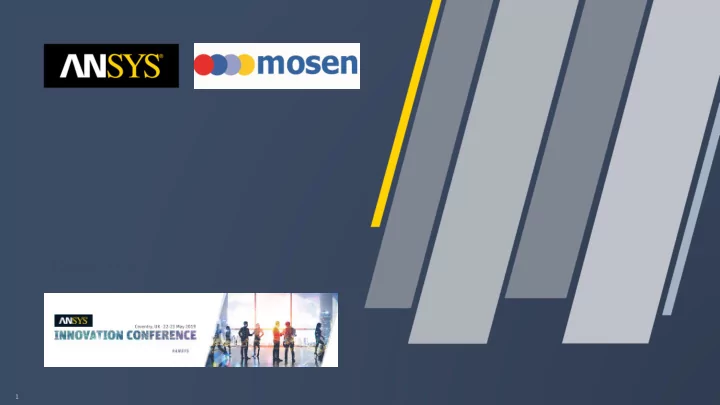

Date and City 1
MoJet Tunnel Ventilation – Testing and CFD Analysis Dr Fathi Tarada Managing Director Mosen Ltd 2
Introduction to Mosen Ltd www.mosen.global Mosen Ltd is an engineering consultancy with expertise in • tunnel ventilation • fire safety engineering • risk management • tunnel safety • Computational Fluid Dynamics We have worked on >100 tunnels worldwide. 3
Motivation • Cost and power consumption for tunnel ventilation can be very high • The MoJet was invented as a sustainable, energy-efficient device, using ANSYS CFX • Measurements were undertaken to check the real performance mosen mosen
Agenda 1. What is the MoJet? 2. Model scale tests 3. Full-scale tests 4. Conclusions and outlook mosen mosen
MoJet • Energy-efficient jetfan • Uses shaped nozzles • Reduces the Coanda effect, hence increasing the in-tunnel thrust • Reduces the in-fan pressure drop, hence reducing the power consumption mosen mosen
Model Scale Testing mosen mosen
Model Scale Testing • Undertaken at the Institute of Aerodynamics, RWTH University in Aachen • History of previous research in tunnel aerodynamics with jetfans mosen mosen
1:18 Model Scale Tests Jetfan diameter = 7 cm mosen mosen
Model-Scale Tunnel • 10 m long • Jetfans installed at 2 m from inlet portal • PIV air velocity measurements undertaken near outlet portal mosen mosen
1:18 Model Scale Tests mosen mosen
MoJet Installation mosen mosen
Flow Discharge from MoJet mosen mosen
Results from Model Scale Tests Value Reynolds Number (Real to Model Scale) x 18 Tunnel friction drag (MoJet to conventional) -20% Jetfan thrust/power ratio (MoJet to +10% conventional) mosen mosen
Full-Scale Testing mosen mosen
Montgomery Tunnel, Brussels Jetfan installed in tunnel corner mosen mosen
Full-Scale Jetfan Testing • 500 m long tunnel • 10 jetfans in each tunnel bore; mixture of 550 mm and 630 mm internal diameter • 3 jetfans to be replaced for test • Conventional jetfan and MoJet comparison (in-tunnel thrust and power consumption) • Test scheduled in 2019 mosen mosen
Tunnel Geometry Northern portal Fan 16 Fan 18 Traffic and flow Fan direction 20 Southern portal mosen mosen
Case configuration • The simulations were run in CFX 19.2 with the following conditions: – Fan rotational speed of 2900rpm – Non-buoyant model – 1 atm Reference Pressure – Total Energy with Viscous Work Term – Turbulence Model SST mosen mosen
CASE SET-UP mosen mosen
Case Set-Up • The conventional jetfan and MoJet (exhaust silencer only) were compared in the following CFD simulations: – Bench thrust (jetfans in isolation). – Three fans running in the Southernmost locations (16, 18, 20) of the Northbound tunnel (flow direction going from South to North). mosen mosen
Case configuration BENCH THRUST SIMULATIONS mosen mosen
Case configuration • Motor mesh mosen mosen
Case configuration • Blade mesh mosen mosen
Case configuration • Silencer mesh mosen mosen
Case configuration • Conventional jetfan volume mesh 23 million cells mosen mosen
Case configuration • MoJet volume mesh 29 million cells mosen mosen
Case results BENCH THRUST SIMULATIONS mosen mosen
Case results • Experimental results: – Ux 30.5 m/s (21° pitch angle) • Conventional jetfan – Ux 27.5 m/s (mass flow average) – VFR 8.21 m³/s • MoJet – Ux 30.8 m/s (mass flow average) – VFR 8.27 m³/s mosen mosen
Velocity Contours mosen mosen
Velocity Contours mosen mosen
Flow Deflection • The MoJet achieved a deflection angle of 11° from the horizontal axis. mosen mosen
Case configuration TUNNEL SIMULATIONS mosen mosen
Case configuration • Tunnel volume mesh mosen mosen
Case configuration • Conventional jetfan volume mesh 50 million cells mosen mosen
Case configuration • MoJet volume mesh 51 million cells mosen mosen
Case results TUNNEL SIMULATIONS mosen mosen
Case results • Contour plot of velocity at the Northern portal outlet. Conventional MoJet mosen mosen
Case results • The volumetric flow rate (m³/s) is shown below : Conventional MoJet • – Location 20 8.30 8.36 – Location 18 8.32 8.35 – Location 16 8.32 8.35 mosen mosen
Case results • Applying the volumetric flow rates from the tunnel simulations to 1D CFD (using IDA RTV) produces the following installation factors : – Conventional 0.25 – MoJet 0.53 (+112%) mosen mosen
Velocity Streamline Comparison Location 20 streamlines Conventional MoJet Downstream clipping plane (X130m) active to show distribution within tunnel mosen mosen
Velocity Streamline Comparison Location 18 streamlines Conventional MoJet Downstream clipping plane (X130m) active to show distribution mosen mosen
Velocity Iso-surface Comparison U 10m/s iso-surfaces Conventional MoJet mosen mosen
Case results • As expected a decrease in shear stress on the tunnel walls is noted with the MoJet. MoJet Conventional Conventional mosen mosen
Flow Distribution • A comparison of the flow leaving the first fan (location 20) shows the MoJet having better distribution within the tunnel. • The flow from the conventional fan remains attached to the tunnel ceiling and walls, thereby reducing efficiency. • The flow from the conventional jetfan (at location 20) also gets re-ingested by the downstream fan (location 18). mosen mosen
Velocity & Thrust Comparison • The average velocity at the Northern portal (outlet) was: – Conventional • Flow speed 1.59 m/s – MoJet • Flow speed 2.28 m/s (+44%) • Thrust increase above conventional jetfan +106% mosen mosen
Conclusions and Outlook • ANSYS CFX has been used to develop a patented new product for tunnel ventilation – the MoJet • Significant reduction in the number of jetfans required in a tunnel • Model-scale tests have confirmed the potential benefits of the MoJet • Full-scale tests planned for 2019 mosen mosen
www.mosen.global mosen mosen
Presentation Title (required) [28pt, bold] Thank You and Questions 49
Recommend
More recommend